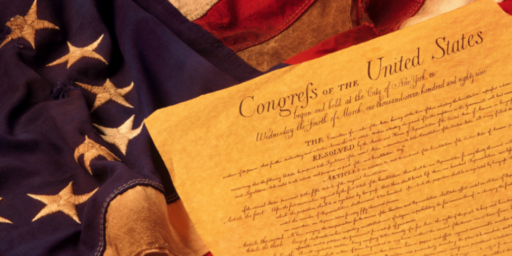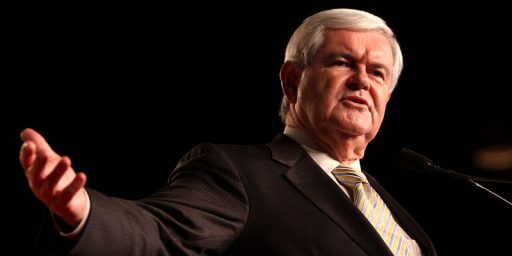Judge: School Pledge Is Unconstitutional
A federal judge in California has ruled that the Pledge of Allegiance is unconstitutional since it contains the phrase “under God.”
Judge: School Pledge Is Unconstitutional (AP)
Reciting the Pledge of Allegiance in public schools was ruled unconstitutional Wednesday by a federal judge who granted legal standing to two families represented by an atheist who lost his previous battle before the U.S. Supreme Court. U.S. District Judge Lawrence Karlton ruled that the pledge’s reference to one nation “under God” violates school children’s right to be “free from a coercive requirement to affirm God.”
Karlton said he was bound by precedent of the 9th U.S. Circuit Court of Appeals, which in 2002 ruled in favor of Sacramento atheist Michael Newdow that the pledge is unconstitutional when recited in public schools.
Except that ruling was made by a three judge panel and the 9th Circuit as a whole overruled it and SCOTUS ruled the father had no standing.
Update: The expanded AP story gives more information. The pertinent additions:
The Supreme Court dismissed the case last year, saying Newdow lacked standing because he did not have custody of his elementary school daughter he sued on behalf of. Newdow, an attorney and a medical doctor, filed an identical case on behalf of three unnamed parents and their children. Karlton said those families have the right to sue.
[…]
Karlton, appointed to the Sacramento bench in 1979 by President Carter, wrote that the case concerned “the ongoing struggle as to the role of religion in the civil life of this nation” and added that his opinion “will satisfy no one involved in that debate.” Karlton dismissed claims that the 1954 Congressional legislation inserting the words “under God” was unconstitutional. If his ruling stands, he reasoned that the school children and their parents in the case would not be harmed by the phrase because they would no longer have to recite it at school.
That explains why Nednow is back in court–he’s acting as attorney, not client–but does not explain Karlton’s logic. My guess is the problem rests with the AP reporter rather than Karlton. I haven’t seen the opinion yet and the Volokh Conspirators are silent thus far. Howard Bashman links the SF Chronicle account of the story, which isn’t any more helpful.
Reciting the Pledge of Allegiance in public schools is unconstitutional, a federal court judge ruled today, saying that the pledge’s reference to “under God†violated school children’s right to be “free from a coercive requirement to affirm God.â€
[…]
In their lawsuit, each of the adult plaintiffs claimed that he or she had “been made to feel like a ‘political outsider’ due to the ‘government’s embrace of (Christian) monotheism in the Pledge of Allegiance,’ †Karlton wrote.
I want my instant analysis and I want it now!





Our forefathers had a soloution for guys like Newdow and Federal Judge Karlton.
It was TAR and Feathers.
They need to be run out of the country on a rail.
Right, the SCOTUS punted on standing, leaving the merits to another day.
But I think you’re wrong about the 9th as a whole; the SCOTUS op says they denied en banc review, with 9 judges dissenting therefrom.
Anyway, it was bound to come up on the merits sooner or later. Whither Lemon?
How can the judge claim precedent when the SCOTUS ruled Newdow had no standing? If he had no standing in the federal court system then the original case decision in federal court would be flawed let alone the later appelate record, wouldn’t it? I see no precedent to use as an excuse.
This judge’s decision and reasoning supports the notion that all judges are unaccountable for what they do and erodes the faith we all have in the legal system we rely upon.
The question must be decided sooner or later on the merits by the SCOTUS. Let’s hope sooner so we can put this issue behind us.
I was never big on reciting the pledge in school. Children do not as yet have the cognitive skills to fully grasp its meaning, and the mandatory reciting of a pledge of allegiance seems somewhat Soviet to me.
If adults want to recite the pledge, great. Lets concentrate on teaching kids to read.
The judge actually explains himself pretty well, tho I can’t evaluate the merits of it:
(All cites omitted.)
So let’s not be hasty declaring the judge an idiot, at least, not those of us who are not already experts on the distinction between Article III and prudential standing and its effects on precedential value.
Herb?
This was to be predicted…SCOTUS didn’t rule on the merits of the case, they simply found that Newdow lacked standing and dismissed it…an easy way to avoid dealing with this difficult and potentially politically explosive case!
Now Newdow has found some families that presumably have standing, so if the case makes it to SCOTUS again they’ll have an opportunity to address the real issue…does the congressionally-mandated term “Under God” constitute an unconstitutional Establishment of Religion?
Honestly, the only way I can see the court ruling in favor of the pledge is without abandoning the past several decades of E.C. case law and precedent is to rule that the phrase “Under God” has become so hackneyed, inoccuous and overused that its now lost whatever religious meaning it once had in the Pledge, on currency, etc. If you’re religious, this can’t be a positive outcome, can it?
Otherwise, defenders will have to maintain that the term IS religious in nature, which would render Congress’s addition of “Under God” to the Pledge in 1954 as violative of the Establishment Clause.
The religious right may ultimately “win” in the Supreme Court, but it would seem rather a Pyrrhic victory to me!
Anderson: I’m mostly reacting to the AP coverage, which is non-sensical. If the report is to believed, the judge simultaneously ruled “under God” was a 1st Amendment violation and that it wasn’t.
Don, I think the Court is more likely to revise the much-distressed Lemon precedent. I have a hard time seeing Stevens, & maybe Breyer, casting out the Pledge or “under God” from the public classrooms of America.
James, I don’t think you called the judge an idiot, & certainly I didn’t mean to criticize your post. And I think he did rule just as you said, that it was/wasn’t, in the two contexts of school-board meetings (okay) and children in class (not okay).
While some on the court have been inching away from Lemon in recent years, I don’t know if there’s any sort of consensus as to how to replace it.
My prediction…the Court doesn’t have the political guts to remove “Under God” and they won’t overturn sixty years of E.C. jurisprudence. They’ll cut the baby in half and say that “Under God” is acceptable because its not really religious anymore!
As a teacher, I love to comment on the pledge after we say it. I mention the word indivisible, and ask if that means we should be separated by race, creed,gender etc into groups. It’s too bad the liberals with their divisive methodology (feminists,gays,blacks,anti life,etc) can’t understand what elementary kids can – that dividing us into groups isn’t good for America, or the groups
Families represented by an Athiest!!! Oh no! We can’t possibly have any REALITY in this world!
Strike down the asthiest, Lord Jesus!
You *didn’t* just write that.
What effect does “under God” have on kids who don’t believe in God? Divided from the rest of the kids, maybe?
Sheesh. Defend the Pledge as you will, but it’s divisive. It introduces a religious issue into a profession of patriotism. As is suggested by the fact that “under God” was inserted, not by the author of the Pledge, but by Congress.
You’re right that one of the reasons Francis Bellamy (a socialist, by the way) wrote the Pledge in 1892 was to try to bring the country back together now that the Civil War was fading into memory “…One nation, indivisible…”
It was also a good way to sell more flags…
Was the Pledge more effective at uniting the nation from 1892-1954 when God wasn’t in it? Or did it gain greater uniting traction after Congress coopted the deity and wrestled Him/Her into it in the mid-1950s?
Seems to me you could make a case either way…without God, the U.S. defeated the Spanish and took their colonies, defeated fascism, rebuilt Europe, and perfected the mass production of the automobile. Of course, we also had the Great Depression, Jim Crow, and the Treaty of Versailles.
With God, the U.S. was victorious over communism, landed on the moon, and invented artificial sweeteners. Unfortunately, we’ve also had Vietnam, race riots, stagflation, disco, and “B.J. and the Bear.”
You decide…all things considered, I can’t see that we’re any more united with God hogtied in the Pledge than we did when S/He was a free range deity!
If even one person objects to it, it seems a good enough reason to drop the “under God” and go back to the original version of the Pledge. After all, if the fathers of our country could write an entire Constitution–the founding document of our nation–without reference to God, surely we can get by without Him in the Pledge.
As a deep cynic, when will will the next inevitable attack against the pledge occur: what happens if your son or daughter is not a citizen and hold alleigence to another nation? Is it fair to make children who are citizens of another country say the pledge?
Actually, the original flag pledge said just “I pledge allegiance to the flag and to the republic…” It didn’t actually specify to WHICH flag the drones were pledging!
As immigration anxiety reached a crescendo in the 1920s, the pledge was amended to include “flag of the United States of America” to ensure that all of those non-white, non-Protestant immigrants were actually and truly pledging allegiance to the ONE TRUE FLAG, and not secretly thinking of the flag of their homeland when reciting the pledge.
From the day of the Supreme Court’s ruling in Newdow, it’s been crystal clear that (a) another case would be filed, if not through Newdow’s doing then through someone else similarly obsessive; (b) the Ninth Circuit will in due course again hold the Pledge unconstitutional, and will do so regardless of what the district court has or hasn’t done, and regardless of whether it and the district court say they are or aren’t bound by the Ninth Circuit’s prior decision in Newdow; (c) the Supreme Court will grant cert and take the case from the Ninth Circuit again; and (d) this time around, Justice Scalia won’t shoot his mouth off to some Knights of Columbus gathering and therefore won’t have to recuse himself. I respectfully submit that (d) is likely to be the most important difference, maybe outcome-determinative. But that’s still anywhere from a year to two years away, I suspect.
In a genuinely free society all affirmations of religious belief must result exclusively from the free volition of the person making the expression. All imposed religious affirmations, even if they are affirmations that the person making them accepts, are inconsistent with the principles on which a free society is based. Clearly having children say a pledge of allegiance that affirms the existence of God as part of a classroom ritual in which all children in the class are expected to participate is abhorrent to a free society.
More generally, all imposed religion is bad religion.
One nation, under the Flying Spaghetti Monsters.
The A.P. got the story right; the judge is an idiot. While Arlen Specter muses about his “super precedents,” Judge Karlton just went to the opposite extreme and invented the “stupor precedent.”
He had it right, but he was reading a copy of the new EU Constitution when he made his decision. Someone should tell him that the real basis for legal precedent was the 10 Commandments.
‘to ensure that all of those non-white, non-Protestant immigrants’
Russians and Italians and Irish are non-white? The hate is screwing up your brain.
Someone should tell him that the real basis for legal precedent was the 10 Commandments.
This would be comic–like Chekhov on the old Star Trek series insisting that the Russians invented everything–if it were not so pathetic. Legal systems and legal precedent have a long, documented history predating the 10 Commandments. Do you seriously imagine that the Egyptian empire had no notion of laws before the Jewish Exodus?
Certainly, the fathers of our country were not so ignorant of history when they wrote the Constitution, which laid out our legal system without a single mention of God, much less the 10 Commandments.
>Russians and Italians and Irish are non-white? >The hate is screwing up your brain.
Trust me, WASPs wouldn’t have considered these groups “white” in the 19th and early 20th centuries!
“Sarcasm”…look it up…
I was never big on reciting the pledge in school. Children do not as yet have the cognitive skills to fully grasp its meaning, and the mandatory reciting of a pledge of allegiance seems somewhat Soviet to me.
After decades, I find that I still retain the skill that I developed in elementary school of being able say the entire pledge in under 5 seconds on a single breath. Needless to say, not much thought went into that incantation.
The notion of asking children, who are much too young to make any kind of legal binding contract, to make a “pledge” is somewhat ridiculous, and tends to undermine the meaning of the pledge. I think that the pledge should be introduced (without the divisive “under God” amendment) at a later age, when young people are old enough to understand its meaning and significance.
our “so-called” christian nation
Currently featured at harpers.org is a an aptly humble assessment of religion in The United States, by a scholar and genuine Christian named Bill McKibben, titled “The Christian Paradox”. Were it within my control, this would be required reading for all high school students, everyone desiring to vote, anyone seeking a driver’s license, or a marriage license, all new parents, pretty much everybody. It is a reflection that all who like to wear their “faith” on their sleeves, for purposes that bear no relation to the Gospels, ought to read daily. You know who you are and I fear for you, though less than I fear the spiritual ruin you cause by your ways.
Like McKibben, I was raised in a small town and attended Sunday School and church, 48 out of 52 Sundays, I’d guess. Since graduating from college 24 years ago, I have probably made it to under 48 worship services. That is about to change, for reasons I am unable to explain. I think I have found an Episcopal Parish that follows the admonitions of Jesus having to do with loving one’s neighbors, and shows no sign of having time for the Babbbitish and self-centered faith mixture that prevails in our “religious” culture.
I’ve said enough because my aim here is to recommend this article, not polemic. Mr. McKibben has loved his neighbors, alll of us, by reminding us of the central role that Commandment played in the acts of Jesus. I am trying to so my small part by passing his thoughts along.
The United States is obviously not a Christian nation, no matter how many places the 10 commandments are posted. A Christian nation would not have millions of its people living in abject poverty without sufficient food, clothing, and shelter,and without adequate access to medical care.